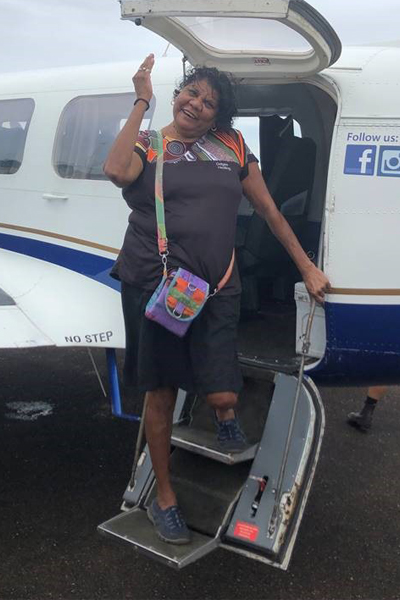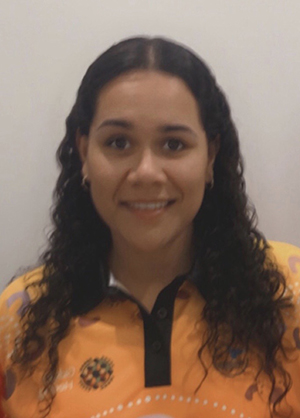Around Australia Aboriginal and Torres Strait Islander communities have responded quickly to the threat of Covid 19. Putting in place travel restrictions and lockdowns has helped to keep Elders and people with chronic health conditions safe from the virus. But, it has also meant big changes to how services are delivered.
In many communities, chronic illnesses such as diabetes, kidney and heart disease are common. People need ongoing treatment which, during a pandemic is especially tough.
In a year that has been defined by Covid 19, we say thank you to the many committed women working in our health services keeping communities safe.
Women like Jenny Cameron.
Jenny is the Operations Manager at Gidgee Healing and looks after the entire lower Gulf region in Queensland which includes the clinics and services operating out of Domadgee, Mornington Island and Normanton.
Like all Aboriginal Controlled Community Health Organisations, Gidgee Healing adopted early measures to keep communities and staff safe.
‘Before the lockdowns I would spend 2 or 3 weeks at Mornington doing the education around social distancing and ensuring that the clinic was all up to standards’, said Jenny.
But, in early March, she came down with an infection and couldn’t travel out to communities. Like all people aged over 50 with chronic disease, Jenny was classified as vulnerable and began working from home in Mt Isa.
‘I was coordinating stuff with Mornington around our lockdown policies and procedures and Covid toolkit that we’ve got and making sure that staff were up-to-date with the most recent information, PPE and all that sort of stuff. Going through the swabbing and what was required. Assisting the hospital when we were doing any major community campaigns.’

Jenny Cameron is a proud Waanyi Garawa woman whose Country stretches across the Gulf of Carpenteria in northern Australia. Jenny is one of the many essential workers at Gidgee Healing.
Jenny Cameron is a proud Waanyi Garawa woman whose Country stretches across the Gulf of Carpenteria in northern Australia. Jenny is one of the many essential workers at Gidgee Healing.
While people in regional and remote areas of Queensland have managed to keep Covid 19 out of their communities, it has been a stressful time for everyone.
‘The community have never seen anything like this before. Seeing people in full PPE and doing swabs was quite foreign to community. They don’t have the same level of exposure as you would if you lived in Brisbane or down on the QLD/NSW border. They might see swabbing on the news but not in their community. It was very confronting.
Because the community has a lot of chronic disease and many of the health workers are also considered vulnerable, they have been very careful about who is coming into the community.
‘If they’ve come from any of the hotspots or areas that have been identified we have our checklist criteria of whether we accept them back into community, what sort of isolation protocols they need to follow before they can come in.’
While there has been anxiety and uncertainty, the past year has also shown how communities have rallied together to keep people safe.
‘Last year put a lot of things into perspective. Community have come together and said we want to protect our community.
‘We’ve got processes in place and the local community councils are working with other services. Bringing the services together has been a highlight for me.’
Jenny is a proud Waanyi Garawa woman whose Country stretches across the Gulf of Carpenteria in northern Australia. She is the mother of six and grandmother of five and is passionate about education and keeping mob healthy.
‘As mothers we’re always going to be carers. Making sure that everyone is safe and protected.
‘I’ve been in health and education for a while now. I’ve worked out in other communities and other AMS’ [Aboriginal Medical Services] in communities as well as mainstream.
‘I want to bring that knowledge back into our communities to educate people about chronic disease, what are the complications associated with diabetes that could then lead into kidney disease and then on dialysis.
‘With all the knowledge and experience that I have, I’d like to share that with people in the communities that I work with.’
Young women on the frontline
Meet Shanyta-Lee who is another of the many essential workers at Gidgee Healing.
Born and raised on Kalkadoon Country in Mount Isa, she spends her days supporting the medical clinics and programs operating out of Mount Isa, Doomadgee, Mornington Island and Normanton in the lower Gulf.
To help stop the spread, Gidgee Healing cut back all but essential face-to-face appointments to minimise the risk posed by their large fly-in-fly out workforce.
For Shanyta-Lee, this meant that she was unable to do her usual visits to the medical clinics at Domadgee, Mornington Island and Normanton in the lower gulf.
‘Normally I would travel up to the Gulf for two or three weeks and then a week back home at Mt Isa. Because of all the restrictions I wasn’t able to travel up to the Gulf. I was just working from here, doing whatever I could pretty much, trying to work around the restrictions. We had to be aware and ready at all times to be the first point of contact.’
It was tough on everyone, dealing with stress and panic in the community, but we all managed to push through. We all worked our best to provide safety and care for our communities’.

Shanyta-Lee Simmons is a proud Alyawarr and Pitta Pitta woman from her father’s side. Her great grandmother (on her mum’s side) is a Torres Strait Islander woman, born on Thursday Island. She is one of the many essential workers at Gidgee Healing.
Shanyta-Lee Simmons is a proud Alyawarr and Pitta Pitta woman from her father’s side. Her great grandmother (on her mum’s side) is a Torres Strait Islander woman, born on Thursday Island. She is one of the many essential workers at Gidgee Healing.
Shanyta-Lee is a proud Alyawarr and Pitta Pitta woman from her father’s side. Her great grandmother (on her mum’s side) is a Torres Strait Islander woman, born on Thursday Island.
‘As a Torres Strait Islander and Aboriginal woman one of the most important things to me is to help make a change for our coming generation.’
‘I am very blessed to be part of the oldest living culture in the world. I want to make sure that our cultural values are sustained.’
‘I’m very grateful to come from a very long line of strong women. It’s very important to me that our voices are heard and that our opinions are considered’.